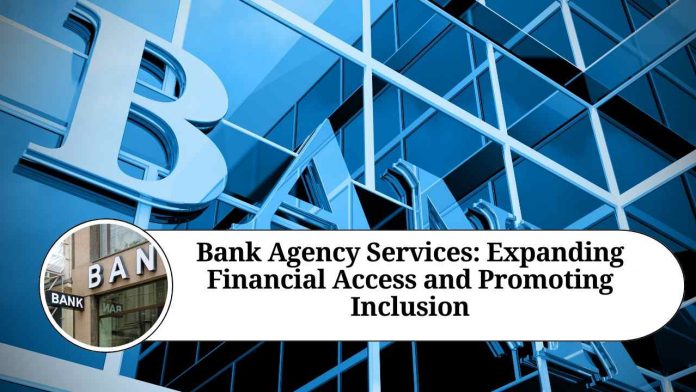Banking is an essential aspect of modern-day life, providing financial solutions to individuals and businesses alike. In recent years, banks have expanded their reach by offering agency services to customers. Bank agency services are the provision of banking services by non-banking entities authorized by the central bank to operate as agents of the bank. These services are provided to individuals and businesses in areas where the bank’s physical presence is limited.
Bank agency services are an excellent way to extend banking services to remote areas, providing financial inclusion to individuals who would otherwise not have access to banking services. These services are typically offered by entities such as post offices, retail shops, and even mobile network operators. By partnering with these entities, banks can offer a range of banking services, including account opening, cash deposits and withdrawals, bill payments, and loan disbursals.
One of the benefits of bank agency services is their ability to bring banking services closer to the customer. Customers in remote areas no longer have to travel long distances to access banking services, making it easier for them to conduct financial transactions. This, in turn, helps to boost economic growth in these areas by facilitating financial transactions and making it easier for businesses to access capital.
Another benefit of bank agency services is their ability to reach a wider customer base. With the increasing penetration of mobile phones and the internet, it is becoming easier for people to access financial services remotely. Bank agency services enable banks to tap into this growing customer base by offering their services through digital channels such as mobile banking and internet banking.
However, like any other financial service, bank agency services come with their own set of risks. One of the risks associated with bank agency services is the potential for fraud. The lack of physical oversight and security in remote areas can make it easier for fraudsters to carry out their activities undetected. Banks need to implement strict security protocols and carry out regular audits to minimize the risk of fraud.
Another risk associated with bank agency services is the potential for operational issues. Since the services are provided by non-banking entities, there is a risk that they may not have the necessary infrastructure or training to provide quality services. Banks need to provide adequate training and support to these entities to ensure that they are providing high-quality services to customers.
In conclusion, bank agency services are an innovative way for banks to extend their reach and provide financial services to customers in remote areas. They offer several benefits, including increased financial inclusion and access to a wider customer base. However, banks need to be aware of the risks associated with these services and take appropriate measures to minimize them. With the right infrastructure, training, and support, bank agency services can help to drive economic growth and financial inclusion in remote areas.
Bank agency services have been a popular option for banks to extend their reach and provide financial services in areas where they have no physical presence. This is particularly important in developing countries where there are large portions of the population without access to banking services. Bank agency services enable banks to reach these underserved areas and provide a range of financial services to customers, such as savings accounts, loans, and insurance.
One of the benefits of bank agency services is that they can provide an additional revenue stream for the agency. Agents can earn commissions for providing banking services, and this can be a valuable source of income for small businesses in remote areas. Additionally, banks can benefit from the cost savings associated with not having to build and maintain physical branches in these areas.
Moreover, bank agency services have also helped to promote financial literacy and awareness in underserved communities. Agents can educate customers about the benefits of banking services and how to use them effectively. This can help to promote financial inclusion and encourage individuals to save and invest in their future.
Furthermore, the growth of mobile banking has made bank agency services even more accessible. Many bank agency services are now available through mobile banking apps, which makes it easier for customers to conduct financial transactions from the comfort of their own homes. This has been particularly important during the COVID-19 pandemic, where many customers have been unable to visit physical branches due to lockdowns and social distancing measures.
Conclusion
In conclusion, bank agency services have become an important aspect of modern banking. They enable banks to extend their reach and provide financial services to underserved communities, promote financial literacy, and provide an additional revenue stream for small businesses. As mobile banking continues to grow, bank agency services will become even more accessible, providing greater financial inclusion for all. However, banks must be mindful of the risks associated with these services and ensure that appropriate measures are in place to protect customers’ financial security.
Other Related Blogs: Section 144B Income Tax Act
Frequently Asked Questions (FAQs)
Q: What are bank agency services?
A: Bank agency services are financial services provided by non-banking entities authorized by the central bank to operate as agents of the bank. These services include account opening, cash deposits and withdrawals, bill payments, and loan disbursals, among others.
Q: Who can provide bank agency services?
A: Non-banking entities such as post offices, retail shops, and mobile network operators can provide bank agency services.
Q: What are the benefits of bank agency services? A: Bank agency services bring banking services closer to the customer, making it easier for individuals and businesses to conduct financial transactions. They also help to promote financial inclusion and reach a wider customer base.
Q: What are the risks associated with bank agency services?
A: Bank agency services come with the potential for fraud and operational issues. There is a risk that non-banking entities may not have the necessary infrastructure or training to provide quality services. Banks need to provide adequate training and support to these entities to minimize the risk of fraud and operational issues.
Q: Are bank agency services available in all areas?
A: Bank agency services are typically available in areas where the bank’s physical presence is limited. However, this may vary depending on the bank and the country.
Q: How can I access bank agency services?
A: Bank agency services can be accessed through non-banking entities authorized by the central bank to operate as agents of the bank. Some bank agency services may also be available through mobile banking apps.
Q: Is my financial information secure when using bank agency services?
A: Banks and non-banking entities providing bank agency services must comply with strict security protocols to protect customers’ financial information. It is important to ensure that you are using a reputable bank or agency and to take appropriate measures to protect your personal and financial information.
Q: What is the role of a bank agency?
A: The role of a bank agency is to act as a representative of a bank and provide various financial services on behalf of the bank, such as account opening, deposits, withdrawals, loan disbursements, and other banking transactions.
Q: How do bank agencies differ from traditional banks? A: Bank agencies are typically operated by non-banking entities, such as post offices or retail shops, that have been authorized by the central bank to provide banking services. They do not have the same physical presence as traditional banks but provide many of the same services.
Q: Are bank agencies regulated by the central bank? A: Yes, bank agencies are regulated by the central bank and must comply with the same regulations and guidelines as traditional banks.
Q: What types of financial services are available through bank agencies? A: Bank agencies can provide a wide range of financial services, including savings accounts, loans, insurance, bill payments, and other banking transactions.
Q: Can anyone use bank agency services? A: Yes, bank agency services are available to anyone who meets the requirements set by the bank and the agency. In some cases, individuals may need to provide identification documents or meet other criteria to access banking services.
Q: What are the benefits of using bank agency services? A: Bank agency services offer greater convenience, particularly in areas where traditional banking services may be limited. They can also help to promote financial inclusion by making banking services more accessible to underserved communities.
Q: How can I find a bank agency near me? A: Banks typically provide information on their website about the locations of their authorized bank agencies. You can also inquire at your local post office or retail shop to see if they offer banking services.
Q: Is it safe to use bank agency services? A: Yes, bank agency services are generally safe and secure as long as you use reputable banks and agencies. It is important to take appropriate measures to protect your personal and financial information, such as safeguarding your passwords and not sharing them with anyone.




















